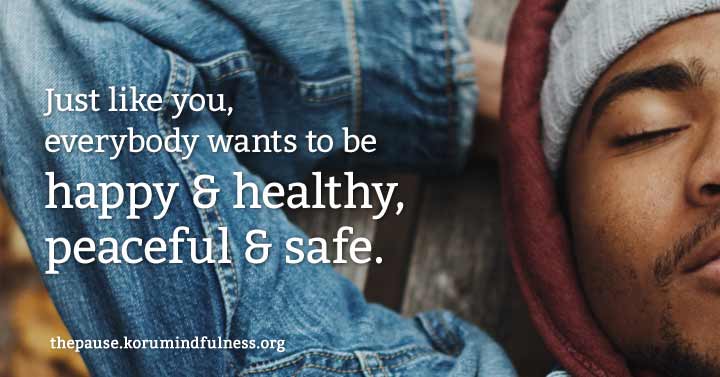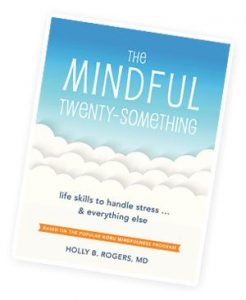
I have this whole fantasy about what the world would be like if humans had a super-strong, built-in capacity to really get what it feels like to be in someone else’s shoes.
In my fantasy, there would be no war or prejudice or oppression. To my mind, those evils depend on our false notion that folks who have different beliefs or look differently or behave differently somehow don’t matter as much.
One limitation of our human nervous system is that we don’t easily take in someone else’s lived experience. If we ourselves have not lived it or felt it, we don’t recognize or believe it. As a psychiatrist working in a college counseling center, I come across this phenomenon all the time.
If you’ve been there, you know depression is a drag.

For example, if you have never experienced what if feels like to struggle with depression, you will not really understand depression. You are likely to think it is the same as feeling really sad or really tired. You may believe that if you just “toughen up” you ought to be able to “get over it” or “shake it off”.
But if you ever have the misfortune to develop a depressive episode, you will then understand that it is a totally different animal than sadness. You’ll see that it is a settled, nearly unbearable pain and confusion that you could no more “shake off” than you could a bad case of the flu.
Later, when you are well again, if someone else tells you they have depression, then you will know exactly what they are dealing with because you have lived it yourself.
If you ever do end up with depression, I hope you will recognize that it is a treatable condition and get help for it. If you ever know someone else with depression I hope you will not view them as weak, but instead encourage them to get treatment, recognizing that you probably can’t really imagine exactly how they feel.
We’re now on Instagram and Snapchat! Make sure to connect with us for tips and inspiration!
The limitation of your own experience.
Unlike depression, which can happen to any of us, you will never have the chance to live in someone else’s skin and view life from their perspective. Which means you have to find some other way to get a clue about what it feels like to have different abilities; or be a different race; or to have a different sexual orientation or gender; or to come from a different culture.
For instance, I am a white, cis-gender, hetero female who grew up in small town Oklahoma, going to a Protestant church. So if I come across other folks from this very narrow demographic, I feel like I pretty much get them. (I may be wrong though, which can cause other problems I don’t have the space to go into here.)
Everyone else, I’m going to have to put some work into understanding. And it may take a pretty serious slap in the face for me to wake up to the fact that I have no idea what it really feels like to be in their shoes.
It starts with Awareness
Fortunately, there is a way we can bridge this gap and begin to get a glimmer of understanding.
It starts by cultivating our awareness. And how do you cultivate awareness?
If you have read my blogs or books before, you will be able to guess what is coming next, because you know that I am a broken record when it comes to these things.
Mindfulness meditation is awareness training. Through practicing mindfulness, you are training your mind to see through your assumptions and biases to the reality that lies beneath them.
You are also opening yourself up to the possibility of having true empathy for others.
Loving Kindness. Sounds weird, but it works.
One type of meditation that can help us develop our capacity to see more clearly and care about folks who seem different from us, is a meditation known as Loving Kindness Meditation, which I’ll call “LK” for short.
When you practice LK, you offer positive wishes to yourself and to others by repeating silently to yourself a series of phrases such as:
May you be happy.
May you be healthy.
May you be peaceful.
May you be safe.
You start out offering them to yourself while you sit in meditation (May I be happy, etc.) and then you offer them in sequence to someone who has been helpful to you, someone whom you know is suffering, a neutral person, a difficult person, and then everybody, everywhere. You can use Koru’s guided LK meditation if you want to try it out.
The “neutral person” to whom you offer LK is supposed to be someone you are familiar with but don’t really know. Maybe it is the person who drives your bus or sells you your coffee or sits next to you in class. You maybe don’t even know their name or anything else about them.
Yet, even though you know literally nothing about them, you can offer them wishes for well-being because you can be sure that, just like you, they want to be happy and healthy, peaceful and safe.
Doing this practice helps me to get in touch with the important truth that everybody wants the same thing I want—to live with peace of mind and happiness. In this we are all the same.
As we get more and more familiar with this truth, we become less preoccupied with our differences. Gradually we begin to understand that the happiness of any depends on the happiness of all. And maybe we move closer to that fantasy world where war and oppression cease to exist.
Photo by Cassandra Hame on Unsplash
Get our latest articles in your inbox.

Dear Holly – Thank you! I am so aware of this need in our world. Glad to know other “like” beings, even if our demographics are different, even if I don’t know you personally.
Are you familiar with Peter Levine’s work with trauma: Waking the Tiger or Mark Wolynn’s work with epigenetics: It Didn’t Start With You? Actually, many traumas and thus depression are limiting behaviors and compassion responses. World Peace cannot be a reality until we start addressing the release of the pent up energy associated with the traumas. Part of the release process is to literally “shake it off” from the body that is holding the personal trauma or passed down traumas due to epigenetics . Once these are addressed and self-compassion becomes a way of living, then compassion for others can begin.
This makes me think of how my dog shakes himself after getting worked up from a barking session. Afterwards, it’s like his barking mania never happened and he’s back on his bed snoring loudly.
Hi Holly,
Thank you for this post. I pray for world peace daily. It starts with my ability to be at peace with others. Please try to get out of the habit of labeling yourself: “I am a white, cis-gender, hetero female who grew up in small town Oklahoma, going to a Protestant church.” For everything you are doing to try to promote world peace, accepting that you are these labels continues the narrative of divide for all of us. We are all just human.
Hi Derrick, I am so happy that there are folks like you out there praying for world peace daily. Hopefully all our prayers and warm wishes will move us in the direction of peace and understanding.
It seems that you and I have different perspectives on the helpfulness of using language to describe our various identity perspectives.
In my experience, it is helpful for me to be aware of and name the aspects of my identity (white, cis-gender, hetero female who grew up in small town Oklahoma, going to a Protestant church) that have shaped my life experiences, and thus my thoughts and beliefs. It helps me to stay really clear that because we all come from different places and have different experiences, we will have different perspectives, and though I might not immediately understand other points of view, all those perspectives are valuable.
It sounds like you have a belief, shaped by your lived experience, that language that describes identity markers are unhelpful labels that interfere with your sense of connection to other humans.
This is a great opportunity for us both to develop awareness of the thoughts and feelings that underly our beliefs and are shaped by our experiences, noticing with curiosity and compassion when we feel differently from someone else and when we feel the same.